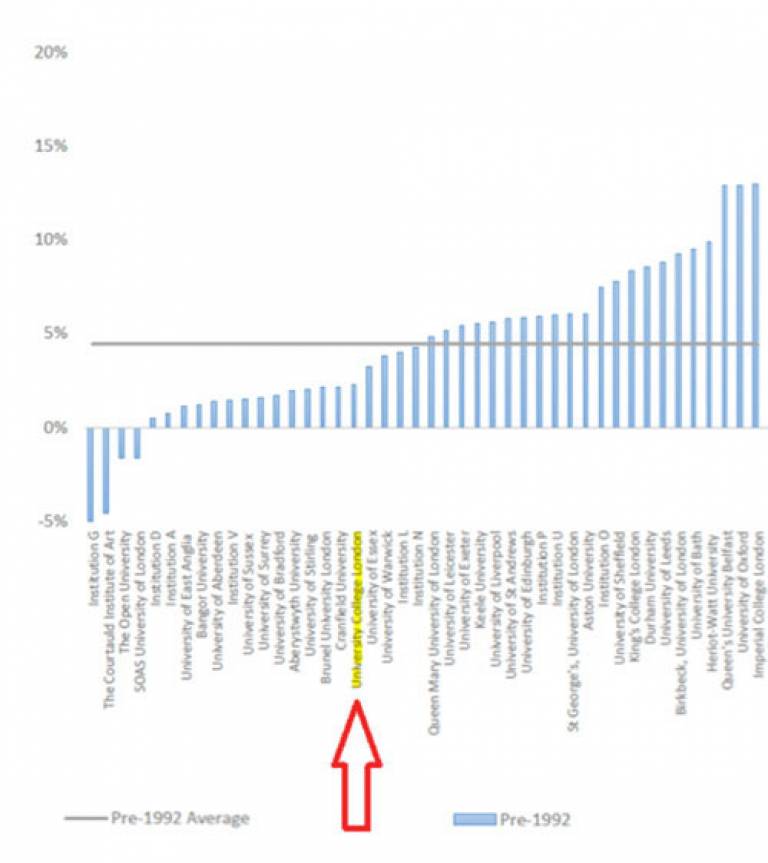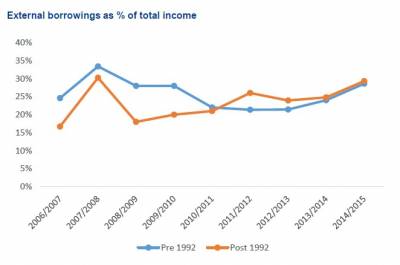Vice-Provost's View: The importance of building financial sustainability
2 June 2016
The Provost has written previously about the essential requirement for UCL to make progress toward a position of financial sustainability.
 This is not only necessary in order to navigate a safe course in an increasingly uncertain and competitive world of higher education, but is also a fundamental enabler of our strategy and our academic aspirations.
This is not only necessary in order to navigate a safe course in an increasingly uncertain and competitive world of higher education, but is also a fundamental enabler of our strategy and our academic aspirations.
A world-leading university that attracts the most able academics and students needs a quality and scale of facilities, technology and support that can only be delivered and maintained from a position of financial stability which allows us to invest to meet our goals. Investment is about supporting new ideas and activities as well as facilities, so we need funds for new appointments as well as buildings and equipment.
Annual surplus of income over expenditure
One of the principal measures of our financial performance is our annual surplus of income over expenditure. Achieving a surplus is the way in which we generate the cash for investment.
We have set a surplus target of 5.5% of income to be achieved by 2017-18 and sustained thereafter. Each year, we have been moving our performance up toward that target - 3.5% this year, 4.5% in 2016-17 and then 5.5% in 2017-18.
The average for the UK higher education sector in 2014-15 was 6.6% and for the Russell Group it was 7%, so while this is some distance from our past performance it is not inconsistent with that being achieved by others.
What is more, all UK universities are also looking to generate more cash for investment in order to address the ongoing reductions in government funding and to respond to competitive pressure, so we can expect the benchmark level of performance to continue to rise.
We are making good progress, having met our surplus target last year. As the chart below indicates, we are moving up relative to other pre-1992 universities, but remain below the average (historic cost surplus for 2014-15 year).
We will shortly be presenting for approval by Council a budget that satisfies the target for 2016-17 and looks forward to a time, beyond 2017-18, when the year-on-year increases will no longer be necessary.
We appreciate that this analysis translates to very challenging targets for faculties, departments, institutes and professional services divisions, with a real impact in terms of expenditure control and the imperative to generate income. We don't underestimate the effect that this can have on morale and are immensely grateful for the effort everyone is making for our collective future benefit.
Borrowing opportunities and context
Our performance as a university and the strength of our balance sheet, with exceptionally low levels of historic borrowing, enables us to take advantage of opportunities to raise debt on highly favourable terms. This allows us to undertake investment now, while our underlying operating performance improves.
We recently concluded terms with the European Investment Bank for a 30-year £280m facility, the largest loan they have offered to a UK university. We also secured, last year, a five-year facility with a 'club' of four UK banks that helps address the peak of capital investment in the early years.
These loans do not in any sense imperil the organisation; our level of borrowing relative to our size will remain below the sector average and we do not anticipate any further borrowing being necessary to deliver the £1.25bn of estate investment over the next 10 years.
The chart below shows that the level of borrowing in the sector, both for pre- and post-1992 universities, is now at almost 30% of total income. Even with these new facilities we will remain comfortably below this level.

This programme of investment in transforming the estate is well underway and you can see the evidence all around the UCL estate. The Provost wrote more about this recently in his Provost's View on 4 May. We are committing support to the digital masterplan that will deliver a stepped improvement in the technology landscape of UCL and also in a range of academic initiatives to be funded from the Provost's Strategic Development Fund.
We are not there yet though and for the next two years we will need to continue to plan and manage our financial resources with care and skill to ensure we reach our goals without undermining our academic excellence or jeopardising our plans for the future.
Government white paper funding changes
The external environment continues to offer challenge and opportunity. The most recently announced changes to the regulatory and funding landscape came in the government's white paper. The proposals contained are broadly as trailed in the green paper, with the most significant being:
- Abolition of HEFCE and OFFA, and their replacement with an Office for Students with a brief to promote quality, choice, equality of opportunity and value for money for students. It will also encourage competition and oversee the entry (and exit) of providers. The new body will be paid for directly by institutions rather than being grant funded by government. Access and participation plans will continue to be required.
- Creation of UK Research and Innovation, overseeing the existing Research Councils along with Innovate UK. This new body will be responsible for managing and distributing core research funding (QR) and the bill helpfully includes support for dual funding, referred to as the 'balanced funding principle'
- The Teaching Excellence Framework will be introduced, with the outcomes linked to the ability of the provider to increase the fee cap, albeit a slower and gentler introduction than previously anticipated
Finally a mention of the Campaign. Plans are well developed for the official launch in September, which will be marked by a series of high-profile events here and abroad, designed to illustrate the far-reaching impact of what UCL does. Global philanthropists want to partner with UCL because they are inspired by what we do and our potential to change and improve lives. We have a great story to tell and can be very confident of success.
As with all successful campaigns, staff involvement plays a big part and I'm delighted that so many people have signed up to attend the Town Hall event on 16 June - you can still register to attend here on the Eventbrite page. There will be more about the Campaign in a future Provost's View, as the launch approaches.
We want you to be assured that the concern and frustration that a tightening financial environment can cause is understood. We also wish to assure you that we remain absolutely committed to ensuring that our academic success is not put at risk while we migrate toward financial sustainability at a measured pace. We need to keep the outcome in view - financial stability, transformation of the estate and academic excellence.
Rex Knight, Vice-Provost (Operations)
Phil Harding, Director of Finance and Business Affairs
 Close
Close

